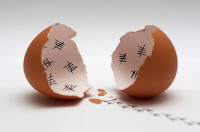 |
| A visual metaphor is worth a thousand words . . . |
Today, the very basics: simile and metaphor. (Though as I discuss below, perhaps it's misleading to think of these as "basic"—or distinct. In fact, this is all pretty complicated . . .) But let's just pretend, for starters, that it's basic:
simile - when something is like something else; comparing two things, or one aspect of a thing with one aspect of something else
"Elderly American ladies leaning on their canes listed toward me like towers of Pisa." — Vladimir Nabokov, Lolita
"Vermeer is blatant and ineffable, like the Sphinx." — Peter Schjeldahl, "Vermeer"
"The working class did not rise like the sun at an appointed time." — E. P. Thompson, The Making of the English Working Class
"Looking for goshawks is like looking for grace: it comes, but not often, and you don't get to say when or how." — Helen Macdonald, H Is for Hawk
"Time has not stood still. It has washed over me, washed me away, as if I'm nothing more than a woman of sand left by a careless child too near the water." — Margaret Atwood, The Handmaid's Tale
metaphor - when something is something else, also by way of comparison, but in the sense of providing a concrete example to explain something ineffable or abstract
"But after the bottle was empty sometime that night, I was finally left with nothing but myself and my thoughts, devious cabdrivers that took me where I did not want to go." — Viet Thanh Nguyen, The Sympathizer
"For a moment, all that remained in the sky was the watermark stain of the moon's dark side. — Craid Childs, The Secret Knowledge of Water
"Memory is a house with ten thousand rooms; it is a village slated to be inundated. — Anthony Doerr, "Village 113"
"'Life,' wrote a friend of mine, ' is a public performance on the violin, in which you must learn the instrument as you go along.'"
— E. M. Forster, A Room with a View
But wait: as I mentioned above, it's not that easy. I actually suspect that some of the examples I have under "simile" are, in fact, more devious metaphors, in that they are expressing something abstract, rather than simply comparing one aspect of a thing with the same aspect of another thing—as in, "The sun rose yellow as a lemon." (I am studying Priscilla Long's examples in chapter 22 of A Writer's Portable Mentor: A Guide to Art, Craft, and the Writing Life [an excellent resource, btw], where she warns that "any random use of like or as does not necessarily result in a simile.") This stuff is complicated. As Milan Kundera wrote in The Unbearable Lightness of Being, "Metaphors are dangerous. Metaphors are not to be trifled with."
Long lists seven forms of metaphor:
1. Adverbial clause of manner, beginning with "as if" or "as though," comparing one action or one object to another that is entirely different.
"His thoughts clogged as if a comb working through his mind had stuck against a snarl." — Annie Proulx, "The Half Skinned Steer"
2. X does something the way Y does something else
"Songbirds fly in and out of towering cottonwoods the way people throng office buildings." — Gretel Ehrlich, The Solace of Open Spaces
3. Appositive as metaphor (an appositive defines a noun: Mr. Brown, the janitor)
"It must be this hovering knowledge, that two-ton safe swaying on a frayed rope just over my head, that makes everyone so glad to see me again. 'How great you are looking! Wow, tell me your secret!'" — Roger Angell (writing at age 93), "This Old Man"
4. Is is like . . . It was like . . . It would be like . . .
"In its most basic form, a plant is like a drinking straw, drawing water and nutrients out of the soil and up through the stems to the leaves, where the water is lost through evaporation." — Geoff Hodge, Practical Botany for Gardeners
5. X is Y (comparing two entirely different things)
"Creative writing, like any art, is a kind of fishing." — John Daniel, "In Praise of Darkness" (and no, that "like" is neither metaphor nor simile, it's just comparison)
6. Word substitution: bringing in a word or phrase from a different world
"The storm came on a wild horse and rode over us. — Norman Maclean, A River Runs Through It
7. Similes
"In a badly designed book, the letters mill and stand like starving horses in a field. — Robert Bringhurst, The Elements of Typographic Style
Thoroughly befuddled? Me too. But it's so much fun to watch out for metaphors—good metaphors, in good writing. Armed with these distinctions, I might have even more fun!


1 comment:
Perfect jet lag reading! Just informative bough to be stimulating with learned examples. Going to be on the look out.
Post a Comment